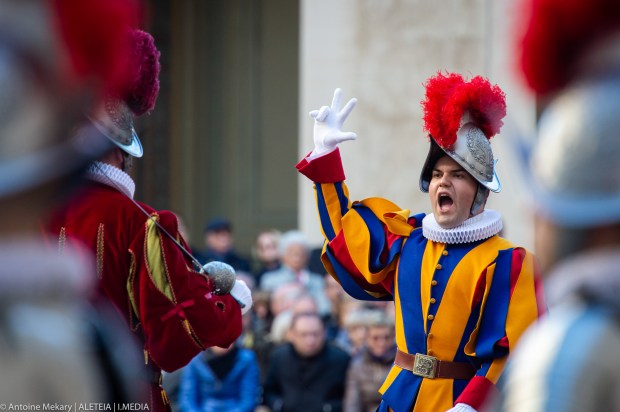Lenten Campaign 2025
This content is free of charge, as are all our articles.
Support us with a donation that is tax-deductible and enable us to continue to reach millions of readers.
Popular imagination constantly ascribes to the Vatican all kinds of conspiracy theories, secrets, and pope-related myths. Some of them might be true, but most of them are pretty easy to bust and debunk. One of those die-hard folk stories claims Michelangelo designed the uniforms of the Swiss Guard at the behest of his patron, Julius II — and the he purposely tried to make them look like harlequins, as if mocking the pontiff.
Now, Pope Julius II was a indeed a fervent, enthusiastic patron of the arts and one of the central figures of the High Renaissance. He was not only considered a political genius by most of his contemporaries (for better or worse), but also commissioned a series of highly significant artistic projects in Rome that would define the history of art for centuries to come. He rebuilt St. Peter’s Basilica, and is also responsible for some of the Renaissance's most revered works: Michelangelo’s painting on the ceiling of the Sistine Chapel and various stanze in the Vatican by Raphael — the noted Raphael Rooms.
Michelangelo mastered many different disciplines. Saying he was an accomplished sculptor, painter, architect, and engineer doesn’t really do him justice. He was, alongside Leonardo, the quintessential, archetypal Renaissance man. But he was certainly not a fashion designer. Attributing the design of the Swiss Guard’s uniform to Michelangelo is but a widespread myth. In fact, the current uniform of the Swiss Guard is way more recent: it was designed in the early 20th century.
In one of Raphael’s stanze, The Expulsion of Heliodorus from the Temple (painted between 1511 and 1512), we see a Swiss Guard in the left foreground. He is carrying the papal litter of Julius II, and is dressed in black and coffee-umber — a color palette that clearly has nothing to do with the famous red, orange, and blue gala uniform we know today. Raphael’s painting clearly shows that the uniform we know was simply not in use then.
But this doesn’t mean the modern uniform has nothing to do with the Renaissance. Introduced by commandant Jules Repond in 1914, the design was indeed inspired by later 16th-century depictions of the Swiss Guard.

In a 1577 fresco by Jacopo Coppi, we see Empress Eudoxia conversing with Pope Sixtus III, handing him St. Peter’s chains. In it, we find what is considered the precursor of today’s three-colored uniform. The colors blue and yellow are said to have been chosen to represent the Della Rovere coat of arms of Julius II, and the red was later added to represent the Medici coat of arms of Leo X.
Make sure to visit the slideshow below to discover the swearing-in ceremony of the Vatican’s Swiss Guards.











